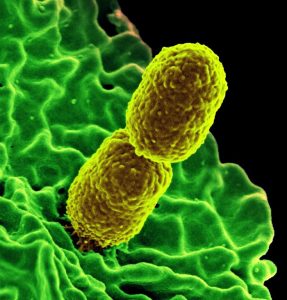Scientists have produced and tested, in mice, a vaccine that protects against a worrisome superbug: a hypervirulent form of the bacteria Klebsiella pneumoniae. And they’ve done so by genetically manipulating a harmless form of E. coli, report researchers at Washington University School of Medicine in St. Louis and VaxNewMo, a St. Louis-based startup.

Klebsiella pneumoniae causes a variety of infections including rare but life-threatening liver, respiratory tract, bloodstream and other infections. Little is known about how exactly people become infected, and the bacteria are unusually adept at acquiring resistance to antibiotics. The prototype vaccine, details of which are published online Aug. 27 in Proceedings of the National Academy of Sciences, may offer a way to protect people against a lethal infection that is hard to prevent and treat.
“For a long time, Klebsiella was primarily an issue in the hospital setting, so even though drug resistance was a real problem in treating these infections, the impact on the public was limited,” said co-author David A. Rosen, MD, PhD, an assistant professor of pediatrics and of molecular microbiology at Washington University. “But now we’re seeing Klebsiella strains that are virulent enough to cause death or severe disease in healthy people in the community. And in the past five years, the really resistant bugs and the really virulent bugs have begun to merge so we’re beginning to see drug-resistant, hypervirulent strains. And that’s very scary.”
Hypervirulent strains of Klebsiella caused tens of thousands of infections in China, Taiwan and South Korea last year, and the bacteria are spreading around the world. About half of people infected with hypervirulent, drug-resistant Klebsiella die. Two types in particular – known as K1 and K2 – are responsible for 70 percent of the cases.
Read more at Washington University School of Medicine
- Top 10 reportable infectious diseases in Salt Lake County
- Taiwan: 2nd local chikungunya case, 1st hantavirus case of the year
- San Diego reports 2nd measles case, 1st flu death
- Michigan health officials report suspect Eastern Equine Encephalitis cases
- Mystery disease in the Ivory Coast kills 28
- Has the USDA Found a Link in the Chicken Listeria Outbreak?

